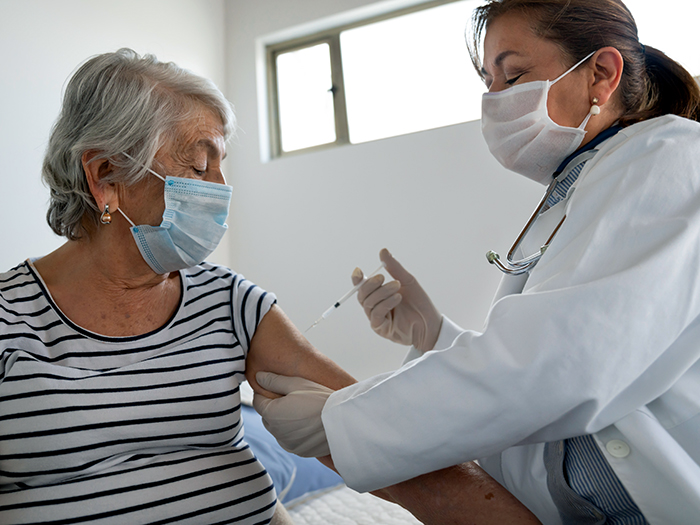4 Vaccines You May Need Now
Many older adults are missing out on essential vaccines. Here are four that can help keep you healthy.

As you get older, it’s increasingly important to keep your immune system strong to reduce your risk of developing certain illnesses. And remember, vaccines aren’t always a one-shot deal: You need boosters or repeat vaccinations at specific intervals to stay protected.
“Vaccines provide an excellent way to prevent illness and remain healthy,” says Richard Watkins, M.D., an infectious disease physician in Akron, Ohio, and an associate professor at Northeast Ohio Medical University.
But which ones do you really need? Here are four vaccines every older adult should ask their doctor about now.
Stay active, have fun, get fit — with SilverSneakers! Classes and events are happening right now at participating gyms, online through SilverSneakers LIVE, and at community centers near you. Activate your free online account to get started.
Vaccines #1: Tdap or Td Booster
Your 11-year-old grandson might have gotten this shot last week, but don’t be surprised if you need one too. If you’ve never had a Tdap shot, you should get one as soon as possible. If you’ve previously had the shot, you’ll need a Td booster every 10 years. Got a severe cut or burn but can’t recall the last time you had a Tdap or Td booster? Check in with your doctor right away.
Tdap helps protect against:
- Tetanus (a.k.a. lockjaw), which causes painful muscle tightening and stiffness
- Diphtheria, which can cause breathing problems, heart failure, paralysis, and even death
- Pertussis (a.k.a. whooping cough), which causes severe coughing spells, difficulty breathing, and vomiting
Vaccine #2: Shingles
Almost one out of every three Americans will develop shingles in their lifetime, and the risk increases as you age. That’s why the Centers for Disease Control and Prevention (CDC) recommends that all healthy adults age 50 or older get two doses of the Shingrix shingles vaccine, two to six months apart.
Shingles causes a painful rash that forms on one side of your body and can last up to five weeks. Many people who develop shingles, which is related to the chickenpox virus, have persistent pain after the rash disappears (called post-herpetic neuralgia), as well as vision issues, facial paralysis, and skin blisters.
Vaccine #3: Pneumococcal
The CDC recommends that all adults age 65 and older get the pneumococcal vaccine, which protects against potentially deadly infections of the bloodstream and lungs, including pneumonia.
There are two different pneumococcal vaccines—PCV13 (Prevnar 13) and PPSV23 (Pneumovax). Current guidelines recommend PPSV23 for all adults age 65 and older. If you’re over 65 and have never had PCV13, talk with your doctor to see if you should.
You cannot get both vaccines at the same time since they need to be administered a year apart. But you can get one of them at the same time that you get your flu vaccine.
If you’re younger than 65 but have certain conditions, such as heart disease, diabetes, or a weakened immune system, your doctor may also recommend a pneumococcal vaccine.
Vaccine #4: Flu
This is the one shot you need every year, but it’s even more important this year to minimize the strain on healthcare systems. Up to 70 percent of hospitalizations related to seasonal flu—and up to 85 percent of flu-related deaths—occur in people age 65 and older, so it’s important to take it seriously. The flu vaccine isn’t perfect, but it will lower your odds of getting sick and decrease the risk of serious complications if you end up getting the flu anyway.
A special high-dose version of the flu vaccine is approved for people age 65 and older. It contains more antigens, which help the body build up protection. In studies involving people age 65 and older, the high-dose flu vaccine was 24 percent more effective than the standard-dose flu vaccine.
Either vaccine takes at least two weeks to start working, so it’s best to get it before the end of October, according to the National Institute on Aging. But anytime during flu season, which can last through March, is a good time to get it.
Subscribe to our newsletter
It's quick and easy. You could be one of the 13 million people who are eligible.
Already a member? Click to discover our 15,000+ participating locations.
Follow Us
Other Vaccines You Might Need
Your doctor may also recommend other vaccines, including:
- The updated COVID-19 shot. The CDC says the new shots are especially important for older adults who are at higher risk for severe illness and hospitalization. If you are scheduling a flu shot, you can get the new COVID vaccine at the same time, according to the CDC.
- Meningitis (Meningococcal menigitis) vaccine. Older adults may be at a higher risk for this inflammation (swelling) of the protective membranes that cover the brain and spinal cord.
- MMR (Measles-Mumps-Rubella) vaccine. If you didn’t receive an MMR shot as a child, check with your doctor to see if you need this.
- Hepatitis A and B vaccines. People 50 and older who are at high risk for these liver infections (caused by different viruses) should talk to their doctor about the combo vaccine that is approved for adults. It is typically given as three separate doses over a six-month period.
Get Ready for Your Appointment
Seeing your doctor annually is the easiest way to ensure that you’re up to date on vaccines. Before you go, check with your health plan to see what’s covered. Or learn more about Medicare coverage for vaccines here.
To help your doctor determine the best vaccines and timing for you, be sure to discuss:
- Health conditions or recent health events, such as hospitalizations or trips to the emergency room
- Current medications, including prescriptions, over-the-counter drugs, vitamins, and supplements
- Previous adverse or allergic reactions to vaccines, so your doctor can recommend an alternative or other steps if needed
Check Your SilverSneakers Eligibility Instantly
SilverSneakers members can go to thousands of nationwide gyms and fitness locations, plus take SilverSneakers LIVE online classes that are designed for all fitness levels and abilities. If you have a Medicare Advantage plan, it may include SilverSneakers — at no additional cost. Check your eligibility instantly here.
Already a member? Get your SilverSneakers member ID and exclusive fitness and wellness content by activating your online account here.
Not eligible for SilverSneakers? You can still get 200+ free SilverSneakers On-Demand videos and stay in touch with us by creating your online account.





